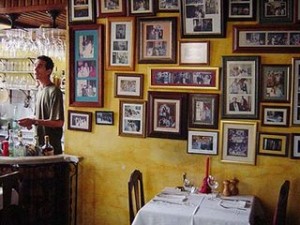more than 20 restaurants will become cooperatives state in October, and hundreds more could go to this form of non-state management in the future if the experiment succeeds.
Workers are forced to accept this form of management. Otherwise, they become unemployed, economists criticize.
All aspects of business, from buying food to the distribution of profits will be decided by the employees, and not, as hitherto, by government officials. A similar process is underway in other sectors such as construction, transportation, agricultural markets and light productions.
These restaurants will be the first to be transferred by the State from the massive nationalization in 1968.
Cooperatives will join the nearly 2,000 private restaurants that have opened on the island with the expansion of self-employment start-up as part of the reforms.
“The government is hoping that the cooperative-proud of their business and profit-motivated will offer a better service and higher quality products to customers, whether they are tourists or fellow countrymen,” said Richard Feinberg, an expert based on Brookings Institution in Washington and author of several studies on the economic reforms in Cuba.
Some restaurants operate in Cuban pesos. Others like La Casona de 17 and La Divina Pastora, both in Havana, they do in convertible pesos (CUC).
La Divina Pastora, located near the Morro Castle in Havana Bay landmark is a building owned by the tour company Seagull, administered by the military.
La Casona de 17 belongs to the Ministry of Tourism and is in charge of Palmares chain.
“We are a pilot, but in the future I think all restaurants in Palmares cooperatives will become,” said Marilyn Herrera, referring to the state company that operates luxury restaurants on the island, during a visit to La Casona, located in the Havana neighborhood of Vedado.
“The Ministry has better things to do,” said Herrera, 25, who is currently studying a degree in Tourism.
Herrera added that will be a challenge for some 50 workers who until now were directed by the State, but felt that this form of management will provide “more flexibility in the way we work and deliver services.”
In the Communist Party Congress held in 2011, adopted a plan of 311 economic reforms Raul Castro said that “the increase in non-state sector (…) allow the State to focus on improving efficiency of the basic means of production, property of all the people and administration divest non-strategic activities for the country “.
Since then, the government has handed over lease thousands of small establishments and taxi services to its employees, and has idle land in usufruct to Cubans interested in making it productive.
“It is an experimental process that will allow us to guide the process and power then after a time, to generalize this experience,” he told local media last week Tristá Grisell, member of the Communist Party commission responsible for implementing the plan reforms.
Cooperatives operate independently of state agencies and enterprises, set prices based on the market most of the time and receive better tax treatment than individual private enterprises, according to a decree published in December.
The law allows an unlimited number of members and hire other workers over a period of up to three months.
While it is difficult to find local experts who oppose the state position, is relatively easy to find critics of the process.
In the case of cooperatives, which the official version is being established on a voluntary basis, most so far are the result of decisions taken at the highest level of government that is forcing workers to choose from selected companies cooperative management accept or become unemployed.
“This was not a spontaneous process based association, at least in most cases,” said a Cuban economist who requested anonymity.
Cooperatives “face a difficult business environment with a decrepit infrastructure, equipment and outdated banking practices, high taxes and restrictions on trade that will make success difficult,” he added.
Sources:DDS/Agencias/InternetPhotos/www.theCubanHistory.com
CUBAN GOVERNMENT Decides covert State Restaurants in Cooperatives
THe Cuban History, Arnoldo Varona, Editor
LA ADMINISTRACIÓN CUBANA DECIDE CONVERTIR A RESTAURANTES ESTATALES EN COOPERATIVAS.
Más de 20 restaurantes estatales se convertirán en cooperativas en octubre, y otros cientos más podrían pasar a esta forma de gestión no estatal en el futuro si el experimento tiene éxito.
Los trabajadores son obligados a aceptar esa forma de gestión. De lo contrario, quedan desempleados, critican economistas.
Todos los aspectos del negocio, desde la compra de comidas hasta la repartición de las ganancias serán decididos por los empleados, y no como hasta ahora, por funcionarios del Gobierno. Un proceso similar está en marcha en otros sectores como la construcción, el transporte, mercados agropecuarios y producciones ligeras.
Estos restaurantes serán los primeros en ser cedidos por el Estado desde la masiva nacionalización en 1968.
Las cooperativas se sumarán a los casi 2.000 restaurantes privados que han abierto en la Isla con la ampliación del trabajo por cuenta propia puesta en marcha como parte de las reformas.
“El Gobierno tiene la esperanza de que los cooperativistas —orgullosos de sus negocios y motivados por las ganancias— ofrecerán un mejor servicio y productos de mayor calidad a los clientes, tanto si son turistas o compatriotas”, dijo Richard Feinberg, un experto basado en Brookings Institution, en Washington, y autor de varios estudios sobre las reformas económicas en Cuba.
Algunos restaurantes operan en pesos cubanos. Otros como La Casona de 17 y La Divina Pastora, ambos en La Habana, lo hacen en pesos convertibles (CUC).
La Divina Pastora, situado cerca del Castillo del Morro, en la emblemática Bahía de La Habana, es una edificación propiedad de la empresa turística Gaviota, administrada por militares.
La Casona de 17 pertenece al Ministerio de Turismo y está a cargo de la cadena Palmares.
“Somos un proyecto piloto, pero en el futuro creo que todos los restaurantes en Palmares se convertirán en cooperativas”, dijo Marylin Herrera, aludiendo a la empresa estatal que opera restaurantes de lujo en la Isla, durante una visita a La Casona, situado en el barrio habanero del Vedado.
“El Ministerio tiene mejores cosas que hacer”, dijo Herrera, de 25 años, que estudia actualmente la licenciatura en Turismo.
Herrera añadió que será un reto para unos 50 trabajadores que hasta hora eran dirigidos por el Estado, pero opinó que esta forma de gestión les dará “más flexibilidad en la forma de trabajar y de ofrecer los servicios”.
En el Congreso del Partido Comunista realizado en 2011, que aprobó un plan de 311 reformas económicas, Raúl Castro dijo que “el incremento del sector no estatal (…) permitirá al Estado concentrarse en la elevación de la eficiencia de los medios fundamentales de producción, propiedad de todo el pueblo y desprenderse de la administración de actividades no estratégicas para el país”.
Desde entonces, su Gobierno ha entregado en arriendo miles de pequeños establecimientos de servicios y taxis a sus empleados, y ha dado en usufructo tierra ociosa a cubanos interesados en hacerla producir.
“Es un proceso experimental que nos va a permitir conducir todo este proceso y poder después, transcurrido un tiempo, generalizar esta experiencia”, dijo a medios locales la pasada semana Grisell Tristá, miembro de la comisión del Partido Comunista encargada de implementar el plan de las reformas.
Las cooperativas funcionan de manera independiente de las entidades estatales y de las empresas, fijan los precios en función del mercado la mayoría de las veces y reciben un mejor tratamiento fiscal que los emprendimientos privados individuales, según un decreto publicado en diciembre.
La ley les permite tener un número ilimitado de miembros y contratar a otros trabajadores en un período de hasta tres meses.
Si bien es difícil encontrar expertos locales que se opongan a las posiciones del Estado, es relativamente fácil encontrar críticos del proceso.
En el caso de las cooperativas, que según la versión oficial se están constituyendo de forma voluntaria, la mayoría hasta el momento son el resultado de decisiones tomadas al más alto nivel de Gobierno, que está obligando a los trabajadores de las empresas seleccionadas a elegir entre aceptar la gestión cooperativa o quedar desempleados.
“Este no fue un proceso espontáneo de la asociación de base, al menos en la gran mayoría de los casos”, dijo un economista cubano que pidió no ser identificado.
Las cooperativas “se enfrentan a un difícil ambiente de negocios con una infraestructura decrépita, equipos y prácticas bancarias obsoletos, altos impuestos y restricciones sobre el comercio que harán difícil el éxito”, agregó.
Sources:DDS/Agencias/InternetPhotos/www.theCubanHistory.com
CUBAN GOVERNMENT Decides covert State Restaurants in Cooperatives
THe Cuban History, Arnoldo Varona, Editor



 © CUBAN GOVERNMENT Decides covert State Restaurants in Cooperatives (Photos) * * LA ADMINISTRACIÓN CUBANA decide convertír a Restaurantes Estatales en Cooperativas (Fotos).
© CUBAN GOVERNMENT Decides covert State Restaurants in Cooperatives (Photos) * * LA ADMINISTRACIÓN CUBANA decide convertír a Restaurantes Estatales en Cooperativas (Fotos).

